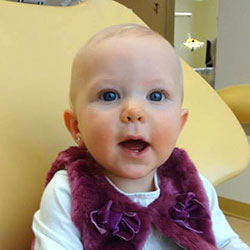Teething
 Normally the first tooth erupts between ages 6 to 12 months. Gums are sore, tender and sometimes irritable until the age of 3. Rubbing sore gums gently with a clean finger, the back of a cold spoon or a cold, wet cloth helps soothe the gums. Teething rings work well, but avoid teething biscuits—they contain sugar that is not good for baby teeth.
Normally the first tooth erupts between ages 6 to 12 months. Gums are sore, tender and sometimes irritable until the age of 3. Rubbing sore gums gently with a clean finger, the back of a cold spoon or a cold, wet cloth helps soothe the gums. Teething rings work well, but avoid teething biscuits—they contain sugar that is not good for baby teeth.
While your baby is teething, it is important to monitor the teeth for signs of baby bottle decay. Examine the teeth, especially on the inside or the tongue side, every two weeks for dull spots (whiter than the tooth surface) or lines. A bottle containing anything other than water and left in an infant's mouth while sleeping can cause decay. This happens because sugar in the liquid mixes with bacteria in dental plaque, forming acids that attack the tooth enamel. Each time a child drinks liquids containing sugar, acids attack the teeth for about 20 minutes. When awake, saliva carries away the liquid. During sleep, the saliva flow significantly decreases and liquids pool around the child's teeth for long periods, covering the teeth in acids.
Infant's New Teeth
The primary, or "baby," teeth play a crucial role in dental development. Without them, a child cannot chew food properly and has difficulty speaking clearly. Primary teeth are vital to development of the jaws and for guiding the permanent (secondary) teeth into place when they replace the primary teeth around age 6.
Since primary teeth guide the permanent teeth into place, infants with missing primary teeth or infants who prematurely lose primary teeth may require a space maintainer, a device used to hold the natural space open. Without a maintainer, the teeth can tilt toward the empty space and cause permanent teeth to come in crooked. Missing teeth should always be mentioned to your family dentist. The way your child cares for his/her primary teeth plays a critical role in how he/she treats the permanent teeth. Children and adults are equally susceptible to plaque and gum problems—hence, the need for regular care and dental checkups.
A Child's First Dental Visit
The first dental visit should be as an infant, prior to age one.
The first dental visit should be scheduled immediately after birth if there are any feeding problems or around 6 months of age if there are no feeding problems, before the first tooth appears in the mouth. The most important part of the visit is ensuring proper growth and development of the mouth and assessing feeding and sleep (airway). It is also to help parents understand their role in preventing tooth decay, this is best done prior to the arrival of the first tooth. And finally it is an important visit for the family to get to know and become comfortable with the pediatric dentist and her team. A pleasant, comfortable first visit builds trust and helps put parent and child at ease during future dental visits. We allow infants and small children to sit/lay back in a parent's lap during the exam. Children are encouraged to discuss any fears or anxiety they feel.
Why Primary Teeth Are Important
Primary teeth are important for several reasons. First, good teeth allow a child to eat and maintain good nutrition. Healthy teeth allow for clear pronunciation and speech habits. The self-image that healthy teeth give a child is immeasurable. Primary teeth also guide eruption of the permanent teeth.
Cavities in primary teeth can lead to infection and spread via the bloodstream to other parts of the body just like permanent teeth; so even though they are temporary, they require treatment to remineralize, prevent enlarging cavities or remove cavities.
Good Diet and Healthy Teeth
The teeth, bones and soft tissue of the mouth require a healthy, well-balanced diet. A variety of healthy foods helps minimize (and avoid) cavities and other dental problems. Most processed snacks that children eat cause cavities, (crackers, pureed fruit pouch, and fruit leather/gummies) so children should receive healthy whole foods like vegetables, or high fat content (low sugar) yogurt and cheeses, which promote strong teeth and jaws.
Infant Tooth Eruption
A child's teeth actually start forming before birth. As early as 4 months of age, the primary or "baby" teeth push through the gums—the lower central incisors are first, then the upper central incisors. The remainder of the 20 primary teeth typically erupt by age 3, but the place and order varies.
Permanent teeth begin eruption around age 6, starting with the first molars and lower central incisors. This process continues until around age 21. Adults have 28 secondary (permanent) teeth—32 including the third molars (wisdom teeth).
Preventing Baby Tooth Decay
Tooth decay in infants can be minimized or totally prevented by not allowing sleeping infants to breast or bottle-feed. Infants that need a bottle to comfortably fall asleep should be given a water-filled bottle or a pacifier - only for a limited time. Bottle and pacifiers, even when they are labeled "orthodontic" are not good on developing jaws/airways and as such are only intended for short periods of time - preferably less than one year. Our office is dedicated to fighting baby tooth decay. Let us know if you notice any signs of decay (white or brown spots) or anything unusual in your child's mouth.